The Virginia Commonwealth Brigade made its tri-annual (or ‘tranual’) journey to the frontera town of Pinares – approximately one hour from La Esperanza, Intibucá. The brigade was comprised of thirteen fourth year medical students, three third year residents and two family medicine attending physicians. In addition, we had five stellar translators (some old faces, some new ones): Josh, Alex, Daniel, Gus and Paulette.
VCU in Pinares is known for hiking out to rural villages in order to provide care, and their most recent brigade certainly embraced that tradition. The normal day entailed leaving one attending, one resident and a few medical students at the clinic to provide care, while the rest of the group trekked out to different villages in order to provide medical assistance as well as collect data for the CHI program. CHI clinics are usually set up at schools, where children progress through a variety of different stations (height/weight, hemoglobin, dental, medical, etc.).
During the weekend we spent a fantastic day at the Concepción market, as well as hiking around the clinic and, of course, a stop at the waterfall.
All in all it was a very positive brigade. The evaluations all demonstrated that each member had a unique, memorable and enriching experience with Shoulder to Shoulder (and that they loved their brigade assistant, of course).
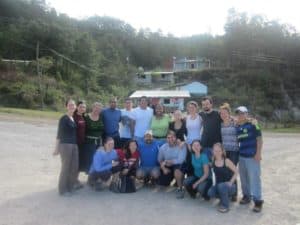
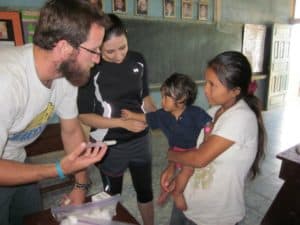
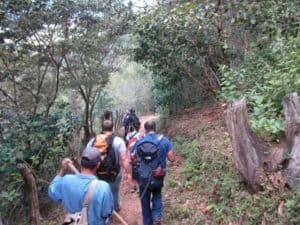
“A great organization with welcoming, dedicated and engaged staff”
“Great trip! Would love to come back!”
MAHEC/Lancaster, PA Brigade (August 6-18, 2011)
The MAHEC/Lancaster Brigade came to Shoulder to Shoulder as a collaborative effort from programs in Lancaster, Pennsylvania and Ashville, North Carolina. Full of diversity, the brigade was comprised of physicians, residents, medical students, pharmacists, one financial consultant and one nutritionist, as well as three younger students. The group set up camp in the church residence in Camasca center, where they received exceptional hospitality from the local people. This is the second brigade that has spent time in Camasca, further building the ever-developing relationship between Shoulder to Shoulder and one of Intibucá’s finest towns. Each day the group traveled to a different “aldea” – or regional village – in order to provide a bevy of medical services. They also did numerous home visits and educational talks. In addition, the group spent time within the Camasca community, working at the CESEMO as well as in the local high school. The extremely positive experience was capped off with a US vs. Honduras basketball game at the community court, arranged by our friends in the Peace Corps. All in all, the second brigade to Camasca went extremely well, and the relationship between Shoulder to Shoulder and Camasca continues to blossom.
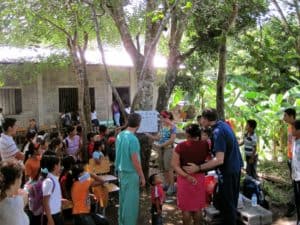
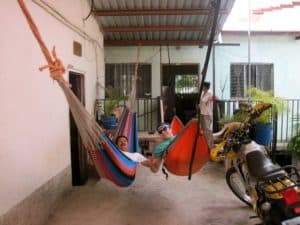
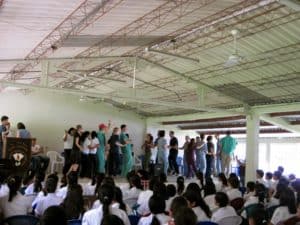
Ohio State/Tepe Dental Brigade (Sept. 5-18, 2011)
The Dental Brigade came to us from the beautiful state of Ohio. They were a fun and energetic group compiled of six Ohio State University dental students, Dr. Burns and Mrs. Burns and Dr. Larry Tepe and Dr. Jan Tepe. During the short time they were here they worked eight long days, swam in the waterfall and went on some hikes in the countryside. Over the eight days the dental brigade with help from the local staff performed over 800 treatments helping the local populations greatly. They also applied fluoride and examined over 400 elementary school students in the area. In addition, they helped to promote healthy dental hygiene to families. We thank them for their hard work and the service they gave to the local community.
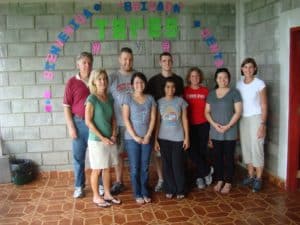
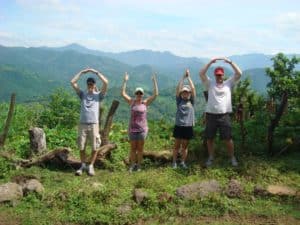
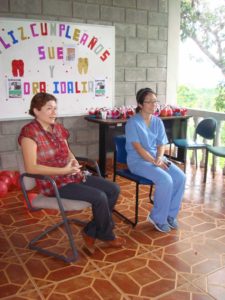
Some reflections from brigade members:
“Enjoyed morning walks-very invigorating. Food preparation was great @ Santa Lucia. Local dental staff helpful and supportive.”
“I really enjoyed the hiking. Other than that, we sort of came up with our own activities. The Honduran doctors at Concepción were super gracious to teach us.”
“Pretty much as expected. We could do what we do anywhere, but the Shoulder to Shoulder clinic provided a great facility to work. No frills but certainly adequate and functional.”


